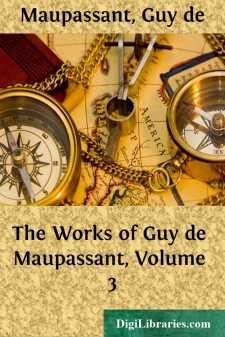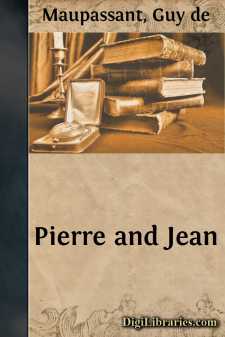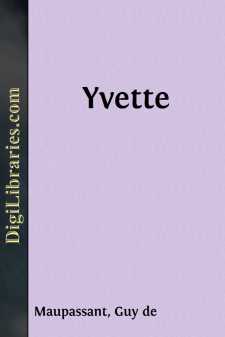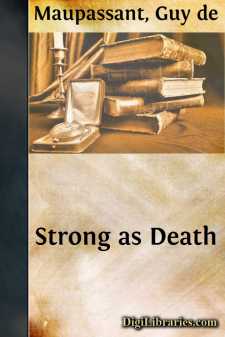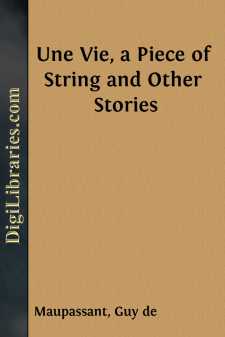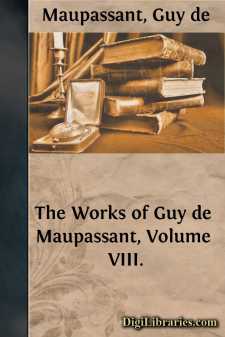Categories
- Antiques & Collectibles 13
- Architecture 36
- Art 48
- Bibles 22
- Biography & Autobiography 815
- Body, Mind & Spirit 144
- Business & Economics 28
- Children's Books 18
- Children's Fiction 14
- Computers 4
- Cooking 94
- Crafts & Hobbies 4
- Drama 346
- Education 58
- Family & Relationships 59
- Fiction 11835
- Games 19
- Gardening 17
- Health & Fitness 34
- History 1378
- House & Home 1
- Humor 147
- Juvenile Fiction 1873
- Juvenile Nonfiction 202
- Language Arts & Disciplines 89
- Law 16
- Literary Collections 686
- Literary Criticism 179
- Mathematics 13
- Medical 41
- Music 40
- Nature 180
- Non-Classifiable 1768
- Performing Arts 7
- Periodicals 1453
- Philosophy 65
- Photography 2
- Poetry 896
- Political Science 203
- Psychology 44
- Reference 154
- Religion 515
- Science 126
- Self-Help 85
- Social Science 83
- Sports & Recreation 34
- Study Aids 3
- Technology & Engineering 60
- Transportation 23
- Travel 463
- True Crime 29
Guy de Maupassant
Guy de Maupassant (1850-1893) was a prolific French writer best known for his short stories, which often depict human nature and the complexities of society with a blend of realism and irony. His most famous works include "The Necklace" and "Boule de Suif," showcasing his keen observation and critique of bourgeois society. Maupassant's literary career was cut short due to mental illness, but he left behind a significant legacy that influenced the short story genre profoundly.
Author's Books:
Sort by:
GUY DE MAUPASSANTA STUDY BY POL. NEVEUX"I entered literary life as a meteor, and I shall leave it like a thunderbolt." These words of Maupassant to Jose Maria de Heredia on the occasion of a memorable meeting are, in spite of their morbid solemnity, not an inexact summing up of the brief career during which, for ten years, the writer, by turns undaunted and sorrowful, with the fertility of a...
more...
"After all," Count d'Avorsy said, stirring his tea with the slow movements of a prelate, "what truth was there in anything that was said at Court, almost without any restraint, and did the Empress, whose beauty has been ruined by some secret grief, who will no longer see anyone and who soothes her continual mental weariness by some journeys without an object and without a rest, in...
more...
CHAPTER I "Tschah!" exclaimed old Roland suddenly, after he had remained motionless for a quarter of an hour, his eyes fixed on the water, while now and again he very slightly lifted his line sunk in the sea. Mme. Roland, dozing in the stern by the side of Mme. Rosemilly, who had been invited to join the fishing-party, woke up, and turning her head to look at her husband, said: "Well, well!...
more...
CHAPTER I. After changing his five-franc piece Georges Duroy left the restaurant. He twisted his mustache in military style and cast a rapid, sweeping glance upon the diners, among whom were three saleswomen, an untidy music-teacher of uncertain age, and two women with their husbands. When he reached the sidewalk, he paused to consider what route he should take. It was the twenty-eighth of June and he...
more...
The Initiation of Saval As they were leaving the Cafe Riche, Jean de Servigny said to Leon Saval: "If you don't object, let us walk. The weather is too fine to take a cab." His friend answered: "I would like nothing better." Jean replied: "It is hardly eleven o'clock. We shall arrive much before midnight, so let us go slowly." A restless crowd was moving along the...
more...
CHAPTER I A DUEL OF HEARTS Broad daylight streamed down into the vast studio through a skylight in the ceiling, which showed a large square of dazzling blue, a bright vista of limitless heights of azure, across which passed flocks of birds in rapid flight. But the glad light of heaven hardly entered this severe room, with high ceilings and draped walls, before it began to grow soft and dim, to slumber...
more...
"I entered literary life as a meteor, and I shall leave it like athunderbolt." These words of Maupassant to José Maria de Heredia onthe occasion of a memorable meeting are, in spite of their morbidsolemnity, not an inexact summing up of the brief career during which,for ten years, the writer, by turns undaunted and sorrowful, with thefertility of a master hand produced poetry, novels, romances...
more...
The most robust and masculine of recent French novelists is a typical Norman, sprung from an ancient noble family, originally of Lorraine, but long settled in the Pays de Caux. The traveler from England towards Paris, soon after leaving Dieppe, sees on his left hand, immediately beyond the station of St. Aubin, a handsome sixteenth-century house, the Château de Miromesnil, on a hill above the railway....
more...
OF "THE NOVEL" do not intend in these pages to put in a plea for this little novel. On the contrary, the ideas I shall try to set forth will rather involve a criticism of the class of psychological analysis which I have undertaken in Pierre et Jean. I propose to treat of novels in general. I am not the only writer who finds himself taken to task in the same terms each time he brings out a new...
more...
The first aim of art, no doubt, is the representation of things as they are. But then things are as our eyes see them and as our minds make them; and it is thus of primary importance for the critic to distinguish the precise qualities of the eyes and minds which make the world into imaginative literature. Reality may be so definite and so false, just as it may be so fantastic and so true; and, among...
more...



